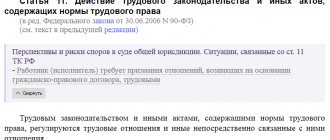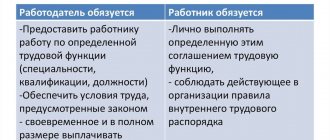Home / Labor Law / Labor Code
Back
Published: 08/06/2016
Reading time: 9 min
0
798
Each branch of law is characterized not only by a set of individual legislative norms and documents, but also by the presence of certain subjects. These entities, in accordance with the law, are endowed with rights and responsibilities and can exercise them in the course of their activities.
The sphere of labor law is no exception, the presence of subjects in which is established by the Labor Code of the Russian Federation. These subjects, as well as their specific rights and obligations, are worth considering in more detail below.
- Concept
- Types Basic
- Minor
Who can have employee status
An employee is an individual who enters into an agreement with an employer, and from the moment of its validity begins to bear a number of obligations. A person who has reached the age of 16 can enter into an employment relationship with the status of an employee, and in some individual cases, according to the Labor Code of the Russian Federation, earlier than this age.
If an individual has reached the age of majority, but is limited in legal capacity by a court decision, then he can still enter into contracts with employers. However, it is important to comply with the conditions - permission from the trustees will be required in writing, and the purpose of the work may be personal service or assistance in housekeeping.
Employer's rights
Like the employee, the employer, being a participant in labor relations, has a certain range of rights. These include the ability to enter into and terminate employment contracts with employees, as well as change their terms at your own discretion, agreeing on each point with the other party to the relationship.
The Labor Code of the Russian Federation gives the employer the right to conduct collective bargaining and enter into collective agreements. Moreover, he has the right to adopt normative acts that have a local principle of action.
The employer can encourage employees with additional payments, rewarding them in this way for conscientious and responsible work, as well as bring them to disciplinary liability in case of failure to comply with labor discipline or improper performance of assigned duties. The employer also has the opportunity to demand from employees high-quality performance of their work.
Who can be an employer
The parties to the labor relationship include the concept of “employer”. It can be not only an individual, but also a legal entity. It is important to note that most employers operating without forming a legal entity have the status of individual entrepreneurs.
It is worth noting that individual entrepreneurs bear responsibility to employees, duties that the Labor Code of the Russian Federation imposes on all employers.
They have the right to carry out their activities only within the boundaries of federal legislation, and the lack of a license does not indicate their release from performing duties.
If the employer is a legal entity, then its main rights will belong to the management body, for example, the director. The following methods are used to distribute responsibilities:
- execution of a power of attorney, according to which a certain person or group of persons is vested with the powers of the employer;
- publication of a normative act that has local effect and does not conflict with current legislation on the transfer of the main responsibilities and powers of the employer to one or more officials.
The general meeting of shareholders serves as an example demonstrating the peculiarities of labor relations and the need to fulfill duties. In such entities, labor relations will be established by this authorized body, if according to the statutory documentation they are not transferred to the board of directors of the enterprise.
Employee rights
The rights and obligations of the parties to labor relations, their guarantees are provided for by the content of the Labor Code of the Russian Federation and, to some extent, by the Constitution of the Russian Federation. These regulations indicate that the basic rights of employees include wages, as well as rest and the availability of safe conditions for carrying out their activities.
In accordance with the provisions presented in the Labor Code of the Russian Federation, any employee has the right to make changes to a previously concluded contract, as well as to terminate it at his own request.
Any work assigned to an employee must comply with the conditions specified in the employment contract concluded with him. Otherwise, an individual has the right not to perform actions required of him outside the established framework.
Based on current legislation, any employee of the enterprise has the right to safe work. This means that his workplace must fully comply with all existing standards, if any, and also be safe. Moreover, the employee must know reliable information about the state of his workplace and how the enterprise implements labor protection for employees.
During breaks between work activities, the employee has the right to legal rest. The Labor Code of the Russian Federation provides for several rest options that are provided to absolutely everyone, without exception: daily breaks for meals, vacations, weekends, and holidays.
An employee of any organization has the right to receive payment for his work. It can be expressed both in monetary terms and in any other pre-agreed form. Payment must be made at the agreed time, without delay, and in full compliance with the qualifications that the employee has, his employment and existing experience.
The rights of workers also include participation in the life of the enterprise, as well as in trade union organizations created within its framework. Moreover, he has the right to strike, as well as to resolve collective and labor disputes, if any arise.
Rights and obligations of the employer
The parties to the labor relationship are the employee and the employer. All basic rights belonging to the employer are conditionally divided into three groups.
Firstly, this is the right to conclude an employment contract with an employee, make corrections and adjustments to this document, and terminate it by termination in the prescribed manner.
Secondly, fundamental rights include rights aimed at fulfilling the employee’s labor obligations. These include:
- the right to insist on fulfillment of obligations, appropriate attitude towards the material base of the company or organization and respect for other employees;
- the right to establish and even consolidate at the local regulatory level internal regulations and requirements for their compliance;
- rights of rewards and incentives for overtime hours of work or high-quality fulfillment of obligations.
And the third group of rights is the protection of one’s own interests and the interests of the entire legal entity:
- may form unions in which employers will be participants, if their goal is to protect legitimate interests;
- can create works councils and put issues related to labor activity on the agenda;
- the right to develop and subsequently implement documentation establishing rules or requirements for employees and the obligations they perform.
The main responsibilities of employers are as follows:
- follow the legislative material on labor issues in force on the territory of the Russian Federation;
- provide employees with work specified in the employment agreement;
- maintain safe working conditions, guaranteed by law and necessary for carrying out activities;
- comply with the time and amount of payment of wages to employees;
- provide the entire work team with the information that is required to sign a collective agreement;
- comply with the requirements of government organizations performing the function of control in the labor sphere;
- provide social health insurance for employees.
Moreover, the duties that the employer must fulfill imply compensation for the costs of employees to fulfill labor obligations (if they were performed by them).
Responsibilities of the employee
Modern legislation provides for a fairly large list of employee rights in comparison with his responsibilities. These include, first of all, the proper execution of the work in full. An employee of any enterprise is obliged to strictly adhere to the established requirements for maintaining safety at the enterprise, as well as to fully and strictly observe labor discipline. If an employee discovers a situation that is dangerous both to his life and health and to other people, he must immediately report this to the occupational safety inspector or management.
The responsibilities of any employee include careful handling of work tools, as well as the property of other employees.
Who has the right to enter into an employment contract?
Only citizens who have reached the age of majority have the right to enter into an employment contract on the part of the employer if they have full legal capacity. Even citizens who have not reached the age of majority can act as employers, if they have already acquired full legal capacity. Art. 21 of the Civil Code of the Russian Federation establishes that a citizen under 18 years of age acquires full legal capacity if he has entered into a marriage union.
Art. 20 of the Labor Code of the Russian Federation establishes that a person under the age of 14 to 18 can act as an employer concluding an employment contract. This procedure is possible if several conditions are met:
- having a source of income, such as receiving a salary or scholarship;
- having written permission from parents or guardians.
Kinds
All subjects of labor law can be divided into two groups:
Basic
The first group includes the main participants in labor relations, which include the employee and the employer. These parties are also established at the legislative level, in particular Art. 20 Labor Code of the Russian Federation.
According to general rules, citizens who have reached the age of 16 years can be subjects of labor law (according to Article 63 of the Labor Code of the Russian Federation). However there are some exceptions:
- Upon receipt of basic general education, citizens over 15 years of age can enter into working relationships.
- Concluding an employment contract is possible from the age of 14, but subject to the following conditions:
- there is written consent to this from the parents, as well as the guardianship and trusteeship authority;
- future work will not harm the learning process;
- working conditions are safe for health and easy.
Minor
The second group unites those entities that play a secondary role in the implementation of labor relations.
These include:
- employment authorities;
- social partners - they are associations of workers or employers represented by elected representatives;
- labor control and supervision bodies;
- primary trade union organization or other representative bodies elected by employees;
- bodies that deal with resolving labor disputes.
The main and most important participants in labor relations are the employee and the employer.
All other bodies, which are also designated as subjects of the Russian Federation, were created primarily for the purpose of regulating relations and protecting their rights and interests. Therefore, these subjects should be further considered in more detail.
Employer's liability
Art. 362 of the Labor Code of the Russian Federation establishes that managers and other officials who are guilty of violating legislation affecting labor issues are held accountable. It could be:
- administrative responsibility. When applying it, the employer pays a fine, the amount of which ranges from 10 to 30 times the wage. The exact amount is determined depending on the violation committed by the employer.
- Disciplinary responsibility. It is expressed in the application of disciplinary sanctions against employers - reprimand, reprimand or dismissal in accordance with the grounds established by Art. 192 Labor Code of the Russian Federation.
- Criminal liability. One of the reasons for its use is the dismissal of a pregnant woman or a mother on maternity leave to care for a child under 3 years of age. Such liability is determined by the Criminal Code of the Russian Federation, the penalties are a fine (its amount varies from 200 to 500 min. wages) or compulsory work.
In all cases, when concluding an employment contract with individuals, employers bear financial responsibility. It affects the obligations arising from the employment relationship.
Author of the article
Article 20 of the Labor Code of the Russian Federation. Parties to labor relations (current version)
A legal entity is considered created from the moment of its state registration, and from this date it can act as an employer.
The legal status of a legal entity is determined by its charter, or the constituent agreement and charter, or only the constituent agreement. In cases provided for by law, a legal entity that is not a commercial organization may act on the basis of the general provisions on an organization of this type.
These documents contain the name of the legal entity, its location, the procedure for managing the activities of the legal entity, as well as other information provided for by the relevant law.
Since the constituent documents of legal entities, as a rule, provide for the subject and goals of their activities, they play an important role in determining the professional and qualification composition of employees with whom the employer can enter into employment contracts.
Among employers, in addition to legal entities and individuals, another entity is named, endowed in cases established by law with the right to conclude employment contracts. Such a subject could be, for example, a local government body, if this is specified in the federal law.
Due to the fact that the Labor Code names legal entities as employers, branches and representative offices cannot be employers. According to Art. 55 of the Civil Code of the Russian Federation, branches and representative offices are not legal entities. They are endowed with property by the legal entity that created them and act on the basis of the provisions approved by it. Their leaders, acting in civil matters, act under the power of attorney of a legal entity.
The head of a branch or representative office may have a power of attorney, giving him the right to hire and fire employees, however, in this case, the branch or representative office is not an employer. The employer in relation to the employees of a branch or representative office is a legal entity on whose behalf the head of the branch or representative office exercises the authority to conclude an employment contract and terminate it. If the head of a branch or representative office is not authorized to hire, labor relations with employees of the branch or representative office arise on the basis of an employment contract concluded by the legal entity itself.
3. The rights and obligations of the employer in labor relations are directly exercised only by the employer who is an individual. All other employers exercise their rights and obligations through management bodies or persons authorized by them. In state and municipal enterprises, the management body is the manager, who is appointed by the owner or a body authorized by the owner and is accountable to him. His rights and obligations are determined by the Civil and Labor Codes, the Law on State and Municipal Unitary Enterprises, and by-laws. For the first time in the practice of codifying labor legislation, the work of the head of an organization is regulated directly by the Labor Code (see commentary to Chapter 43 “Features of regulating the work of the head of an organization and members of the collegial executive body of the organization”).
Of great importance for the legal status of the head of an organization are Decree of the Government of the Russian Federation dated December 3, 2004 N 739 “On the powers of federal executive bodies to exercise the rights of the owner of the property of a federal state unitary enterprise” and Order of the Ministry of Economic Development of Russia dated March 2, 2005 N 49 “On approval of a model employment contract” with the head of the federal state unitary enterprise."
In non-governmental organizations, the rights and obligations of the employer are exercised by its executive management bodies. According to the Law on Joint Stock Companies, management of the company’s current activities is carried out by the sole executive body of the company (director, general director) or the sole executive body of the company (director, general director) and the collegial executive body of the company (board, directorate). The executive body of the company (director, general director) approves the staff, issues orders and gives instructions that are binding on all employees of the company. Similar management bodies exist in limited liability companies. The LLC Law, in more detail than the Law on Joint-Stock Companies, defines the rights and obligations of the executive bodies of a limited liability company for the implementation of its labor legal personality. Article 40 of the LLC Law provides that the sole executive body of the company issues orders on the appointment of company employees to positions, their transfer and dismissal, applies incentive measures and imposes disciplinary sanctions.
All other legal entities also have governing bodies that exercise the rights and obligations of the employer in accordance with the Labor Code, other laws and other regulatory legal acts (federal and constituent entities of the Russian Federation), regulatory legal acts of the constituent entities of the Russian Federation, regulatory legal acts of local governments, constituent documents of the legal entity persons (organizations) and local regulations.
4. The commented article, listing the basic rights and obligations of the employer, also reproduces the provision of the Civil Code of the Russian Federation, establishing that an institution can be budgetary or autonomous. A budgetary institution is responsible for its obligations with the funds at its disposal, and an autonomous institution is responsible for its obligations with all the property assigned to it, with the exception of real estate and especially valuable movable property assigned to the autonomous institution by the owner of this property or acquired by the autonomous institution at the expense of allocated funds. such owner of the funds. The owner of the property of an autonomous institution is not liable for the obligations of the autonomous institution (Article 120 of the Civil Code of the Russian Federation). The activities of the institution are fully or partially financed by the owner (founder) by transferring funds to the institution or assigning other property to it with the right of operational management. If these funds are insufficient, responsibilities arising from labor relations, in particular regarding wages, are additionally assigned to the owner (founder) in accordance with federal laws and other regulatory legal acts.
Subtleties of labor relations
Documents of legal entities, as a rule, contain information about the subject and purpose of the activity, which is of great importance in determining the professional and qualification characteristics of employees with whom the organization can enter into labor relations.
Often large organizations have branches and representative offices. However, only the main legal entity for whose activities a branch or representative office was opened can act as an employer. In fact, they do not have the right to carry out such actions on their own behalf.
The head of any branch or representative office has the right to act on behalf of the organization by concluding, amending or terminating employment contracts. In this case, the legal entity that opened this branch or representative office can act as an employer. It is important for potential hired specialists to know this feature.
What else are the responsibilities of the employer?
In addition to all of the above, the employer is responsible for conducting collective negotiations, concluding collective agreements, providing representatives of its employees with all the information that may be needed during negotiations, as well as creating conditions that allow employees to participate in the production management process.
An entrepreneur or company owner must also take care of compulsory health insurance for his subordinates, as well as compensation for material or moral damage to employees. This is necessary because the parties to labor relations are people who may be exposed to hazardous factors in the process of performing their work duties.
In addition, it is obvious that the employer will timely comply with orders issued by state supervisory and control authorities and pay the fines they impose. There should also be no delay in considering submissions sent by trade union bodies or other representatives elected by employees. Typically, they are subject to identified violations of the law.
Of course, the above list of employer rights and obligations, developed for those who are parties to the employment relationship and employment contract, may not be relevant in all cases. In order to cover situations not covered by these provisions, the Labor Code of the Russian Federation contains a clarification stating that the employer must ensure the fulfillment of other obligations that may be specified in employment contracts, regulations, collective agreements and agreements concluded with employees.
Concept of labor relations
The implementation of a technological process, the end result of which is the creation of a product or the provision of a service, refers to a complex system of relationships between the employer and the subordinate. It, in its essence, becomes the basis of labor relations (EL). This phrase is considered stable and is used everywhere, and its concept is reflected in the Labor Code of the Russian Federation.
In Art. Chapter 15 of Chapter 2 of the Labor Code clearly states that labor relations should be understood as a production relationship between an employer and an employee, based on an agreement on the responsibilities and rights of both parties, the amount of remuneration and other aspects of the work process. In modern society, any type of TO can be considered a dynamic social system that maintains stability for a short time. This is due to the fact that in the course of work, new rights and obligations invariably arise, and previously approved provisions become irrelevant. That is why, when drawing up a contract, general wording is used and universal situations are taken into account.
The legislative framework
Labor relations reflect not only the production interaction declared by the contract, but also the communicative connections that arise between team members in the labor process. Therefore, when entering the scope of maintenance, any citizen should know that there is a whole system of legal norms governing these relations.
Attention! The basic principles are enshrined in the Constitution of the Russian Federation, but the Labor Code remains the main legal act. The second chapter is entirely devoted to various aspects of interaction between employer and subordinate.
- Art. 15 defines TO.
- Art. 16 lists the reasons for their occurrence.
- Art. 17-19 regulate maintenance between the parties to the employment contract.
- Art. 20-22 define the parties to industrial interaction, list their rights and responsibilities.
Signs of labor relations
Labor relations are regulated not only by the Labor Code of the Russian Federation, but also by other regulations. It is they who highlight a number of features characteristic of production connections that arise in the labor process.
- It is based on an agreement reached by the will of both parties.
- Official duties are performed through personal participation.
- Remuneration for labor is determined by qualifications, specialty, position and is fixed in the staffing table.
- The employee is subject to clearly defined internal regulations of the organization (company).
- The employer ensures timely payment of labor and creates optimal working conditions provided for by local regulations and legal norms (location, information, tools).
Industrial relations can be formalized not only within the framework of a working agreement, but also through the formation of civil contracts.
Features of labor relations
In addition to the characteristic features, labor experts also identify a number of features that distinguish technical work based on a formed contract from other types of industrial relations. They are as follows:
- Individual performance of assigned labor functions, participation of third parties is excluded.
- Perform official duties corresponding to the position or specialty.
- Providing conditions in which subordinates will work.
- Submission to the internal rules of the company (enterprise).
If TOs arose on the basis of an employment contract, they are regulated by the norms of the Labor Code of the Russian Federation. In other cases, it is recommended to rely on the provisions of the Civil Code of the Russian Federation.
Types of labor relations
Since TOs are formed on the basis of a concluded employment contract, the types of working relationships are determined by the types of document. Thus, the relationship between a manager and a subordinate is based on:
- open-ended contract (validity period is not determined for various reasons);
- contracts with a certain period.
Quite often, maintenance entities enter into contracts for a long period, so the expiration date of the document is not determined. The absence of reference to the time of termination of the relationship is the basis for recognizing such an agreement as indefinite.
The establishment of a certain period of validity of the contract is determined by the nature of the work performed: temporary, seasonal. Such activities cannot continue for a long time, so the parties enter into a fixed-term contract. The maximum period of viability of such a document is 6 years, except in cases provided for by federal law.
Legal entities
It is this category that makes up the bulk of employers in the labor market. In accordance with the law, organizations are recognized as legal entities, which, in turn, are divided into commercial and non-profit. The main difference is that the former are created for the purpose of making a profit, while the latter have some other purposes for carrying out activities.
A legal entity can exercise its own rights and obligations from the date of state registration. Upon completion of this procedure, it also has the right to enter into labor relations with employees.
Responsibilities imposed on the employer
The main responsibility of any employer is to comply with labor laws. Since the parties to labor relations are people who often have no other source of income other than the wages provided by the employer, the well-being of their families depends on the integrity and honesty of the employer.
In order to protect their interests, the state obliges entrepreneurs and company managers to fulfill the following conditions:
- Compliance with collective agreements and agreements, as well as local regulations.
- Providing subordinates with the work described in the employment contract.
- Providing staff with the tools, equipment and resources necessary to carry out all labor functions.
- Ensuring labor safety in production conditions.
- Creation of working conditions that meet sanitary and hygienic standards.
- Caring for the everyday needs of workers related to the implementation of the labor process.
- Ensuring equal pay for the same period, and in no case lower than the level of pay dictated by law.
- Timely payment of accrued wages.







